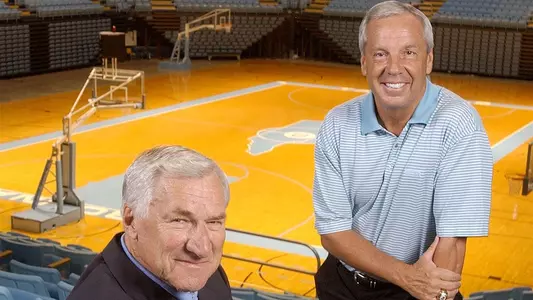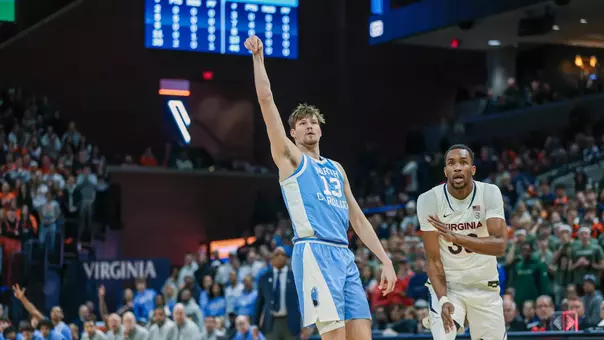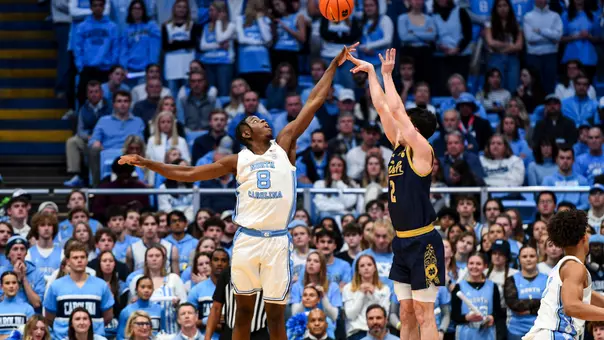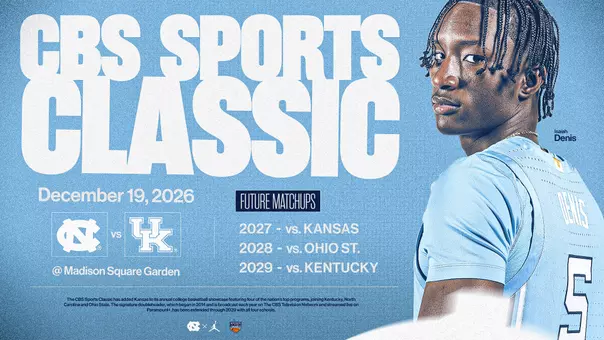University of North Carolina Athletics

Q&A: Roy Williams On Dean Smith
February 13, 2015 | Men's Basketball
In July 2011, Tar Heel Monthly published a special Dean Smith commemorative edition. This interview was conducted exclusively for that issue.
Adam Lucas: You took notes at every one of Coach Smith's practices you attended as an undergraduate. What did you get out of those notes?
Roy Williams: I still have them in a file cabinet at my house. During my high school coaching days, I looked at them every year. During my assistant coaching days at Carolina, I looked at them every year, although maybe not as frequently as when I was a high school coach. I referred to them when I became head coach at Kansas, because it was helpful to review what he taught in what certain part of the year. During my eight years back at Carolina I've gotten them out three or four times in the preseason. That's not because they're not as useful as they used to be. It's because if you copy something over and over, eventually you don't have to go back to the original copy.
AL: You've said you tried to listen more than speak as an assistant. What did you learn from listening to him?
RW: Dean Smith is the best there's ever been, and you can always learn more by listening than talking. Part of it was that I didn't want to say something that was wrong. It was insecurity. I wanted to make sure I didn't miss a single thing that he said.
]AL: How is the way that you respond to your assistants shaped by the way he responded to you when you were an assistant?
RW: I tell them all the time, 'Don't just throw ideas at me. Make sure you know what you're saying.' My third year as an assistant, we were playing at NC State. For some reason, I said, 'Coach, what about 'Biggie' for Sam (Perkins)?' He instantly stood up and called that play. My pulse rate went to about 400 as fast as it could, but we scored.
The next time down, he looked at me and said, 'What about James (Worthy)?' I said, 'Yes, but I would do it to the other side.' We ran it to the other side and James scored. Now, James and Sam scored against a lot of people, so it wasn't my play calling that did it. After the game I said, 'Coach, you scared me to death, because when I made that suggestion you instantly stood up and called it.'
He said, 'You don't make suggestions all the time, so I knew if you made that suggestion you'd really thought about it.' That's why I tell our assistants to know what they are suggesting. Don't just say something off the cuff.
AL: People think of recruiting as a bells and whistles type of thing, but that's not the kind of person he was. What made him an effective recruiter?
RW: It wasn't an age of bells and whistles at that time. It wasn't an arms race with offices and locker rooms. People probably valued the college education and college experience more at that time. The parents could see the sincerity and they could trust Coach Smith with being in a position of direction for their son.
In today's age of bells and whistles, I don't know if he would enjoy it as much. He recruited in a different time, and that different time was perfect for him. When he went in the home, even if there was only one parent there, there was great structure in the home. To this day, I don't think I'm a very good recruiter if there's not some structure in the home. I think it's so important to have family there rather than folks who aren't family, because family will always love you whether you're playing basketball or not. Coach Smith inherently understood that, and he was so strong in making a connection with the family.
AL: How has it helped you that you've recruited in both the bells and whistles age and the time period before that?
RW: I still remember the story about the first time Coach saw Walter Davis. Coach drove up in a Carolina blue Cadillac, and Walter Davis mentioned how much that impressed him. To this day, I get a luxury rental car when I'm recruiting whenever it's possible. That doesn't mean that things don't change. Even Coach Smith was flexible enough to realize when things were changing. But no matter what time period it is, the bottom line has to be that you're talking to a kid about getting an education and being part of a great program, and we are giving the kid an opportunity to be important to that program. That's what Coach Smith did and that's what I still do.
AL: There's a photo you like that shows you sitting in Coach Smith's office as an assistant, and you have a hole in your shoe. What did it do for Roy Williams at that point in his life to sit around with Dean Smith, Bill Guthridge and Eddie Fogler and have those conversations?
RW: When that photo got around, the athletic director at Auburn called Coach Smith and said he needed to buy me some shoes without a hole. I wanted to be a sponge. I've said many times that I copied 90 percent of the things I do from Coach Smith. But Coach Guthridge and Eddie were also fantastic. The things they'd bounce back and forth in that room, I felt like a kid in a candy store who already had both pockets full of candy. I was so far ahead because of the people I could listen to. It was fabulous.
AL: You've said you copied anywhere from 75% to 90% of what you do from him. How did you figure out the 25% to 10% that you've done differently from him?
RW: The night before I left for Kansas, I had dinner at Coach Smith's house. He told me the biggest worry he had was how hard I took the losses. He told me to be myself and not worry about anyone else. He told me to do what I wanted to do and change things every year to fit our personnel. I lived that advice.
At Carolina, we had a simple cut where a screener screens for one big guy and another big guy cut off that screen to shoot it. At Kansas, neither of our big guys could shoot that shot. I called Coach Smith and told him I was thinking about changing that cut. He told me that was great, because it fit our personnel. He always talked about being willing to change. The biggest change offensively is that I want our pace of play to be even faster. On defense, I gamble less and try to play more physically in a straight halfcourt man-to-man. I don't change for the sake of change, which he would sometimes say he liked to do. I'm not as comfortable doing that.
AL: When you accepted the Carolina job, Coach Smith was with you on the ride from the airport to the Smith Center. What was that ride like for you?
RW: Part of it was scary. Part of it was cold chills, because of the people who had lined up on the side of the road and at the turn-in to the Smith Center. That part was a thrill, but it was also scary. I was coming to take control of Coach Smith's program. I still think of it that way today. I knew it was a huge challenge, and I knew it was very dear to my heart. I didn't want to mess it up, so there was some fear because of the challenge. The situation wasn't very good, and that wasn't Matt (Doherty)'s fault. It was circumstances. Everything that could go wrong did go wrong. It was a monumental challenge to me, because I'd never seen the Carolina program in that situation. I knew I had to win games, and I also knew I wanted to bring the former players back together and add some stability to it.
AL: What did it say about Coach Smith that he was there when the plane landed?
RW: I knew he would be there. And I knew he would ride with me in the car to the Smith Center. I thanked him and told him I hoped he hadn't made a mistake. He said some things to me personally that were very simple but that I will never forget. He said I was the right person, and that it wasn't going to be easy, but that he had tremendous confidence in me. That isn't a very long ride to the Smith Center, but even today I have tremendous emotion about it.
AL: When you chose not to come to Carolina in 2000, what did you learn about him?
RW: We talked frequently. I told him people at Carolina didn't know what I had at Kansas, just like people at Kansas don't know what we have at Carolina. He agreed, and said, 'No one knows it like we do.' He thought I knew it even better than him because I had been gone from Kansas for so long. I knew he was with me in whatever I wanted to do. I always knew I had his support, and it didn't waver in those three years. I don't take that for granted, because not everyone was with me during those three years. When I did come back in 2003 and we shook hands and hugged at the airport, it was very emotional.
AL: The night you took the job at Carolina you said he'd taught you to run a program, not coach a team. What's the difference?
RW: Coaching a team is what you do to get the team on the court for game night. But if you're running a program, you're concerned about what is best for the program three years from now, five years from now and ten years from now. And what's best for the kids three, five and ten years from now. What do you want to stand for? Getting a team ready to play a game is part of it, and on that specific game night it's a huge part of it. But I want to be part of something that is bigger than that, and I want to be concerned with everything that has to do with that program.
AL: Sometimes those two goals can be different. How do you balance them?
RW: It's hard. Some decisions you make, you know they aren't best for the team, but they are best for the program in the long term. You have to make those decisions and have confidence to stick with them.
AL: It seems generally accepted that what made Coach Smith so unique is the family atmosphere he created in his program. If everyone knows that, and if that's the one thing that sets his program apart from everyone else, why hasn't anyone else across the country been able to duplicate that?
RW: You can't repeat his sincerity. You can't repeat the way he stuck to those principles every day. Nobody has that patience and care and intelligence and foresight. There are other coaches who have done a great job of running their program. But you just can't replicate the intangibles at the level Coach Smith did them.
AL: Most people don't get to have those closest to them present when they reach one of the highest levels in their profession. What was it like for you to have Coach Smith in St. Louis at the national championship game in 2005?
RW: After the game, I had just turned to one of my assistants and said, 'I wish we could get Coach Smith down here into the locker room.' A couple minutes later, some guy from the NCAA came around and said Coach Smith and Michael (Jordan) wanted to know if they could come back. I will never forget the feeling when I hugged him. I said, 'Coach, thank you so much.' He said, 'No, thank you. This is what I want for you and this is what I want for us.' It's a perfect example of him—I was thanking him for everything, and he was turning it back around and thanking me.














